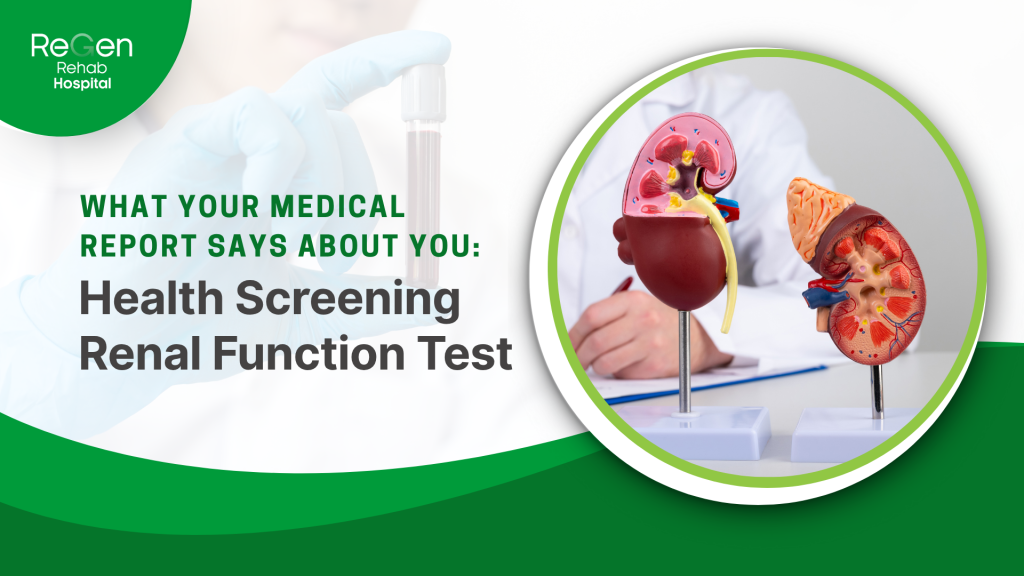Routine health screenings are more than just check-ups. They are an early warning system for your body. Among the most important tests included is the renal function test (RFT), which evaluates how well your kidneys are working. Since kidney problems often develop silently, this test provides crucial insights even before symptoms appear.
Understanding your renal function test results can help you take charge of your kidney health, prevent complications, and make informed decisions about your lifestyle and treatment.
What is Renal Function Test?
Your kidneys filter waste, maintain fluid and mineral balance, and regulate blood pressure. A renal function test uses blood and urine samples to assess these vital processes.
Your medical report will usually include:
- Urea: A waste product from protein metabolism. High levels may indicate impaired kidney function or dehydration.
- Creatinine: Waste from muscle metabolism; elevated levels may suggest decreased kidney function.
- Estimated Glomerular Filtration Rate (eGFR): Reflects how well your kidneys filter blood. Lower values indicate reduced kidney function.
- Uric Acid: High levels may increase risk of gout and affect kidney function.
- Electrolytes (Sodium, Potassium, Chloride): Help maintain fluid balance, nerve function, and heart health.
- Minerals (Corrected Calcium, Phosphorus, Magnesium): Imbalances may suggest kidney dysfunction or metabolic issues.
- Urine Microalbumin & Urine Creatinine: Detect early kidney damage.
- Urine Albumin/Creatinine Ratio (ACR): Measures protein leakage into urine; an early marker of kidney disease.
Why Renal Function Tests Are Important
Kidneys are essential for filtering waste, balancing electrolytes, and supporting overall health. Health screening renal function tests help:
1. Detecting Early Kidney Issues
Elevated urea, creatinine, uric acid, or abnormal eGFR can indicate kidney disease or reduced function.
2. Monitor Chronic Conditions
Diabetes, high blood pressure, and heart disease increase kidney risk. RFT helps track damage early.
3. Assess Medication Effects
Certain medications, including painkillers and antibiotics, can strain kidneys. RFT results help doctors adjust treatments to minimize risks.
4. Identify Mineral or Electrolyte Imbalances
Imbalances in calcium, phosphorus, magnesium, sodium, or potassium can affect bone health, heart function, and metabolism.
5. Evaluate Protein Leakage
A high urine albumin/creatinine ratio (ACR) signals early kidney damage, even before symptoms appear.
Understanding Your Renal Function Test Results
Your renal function report lists each parameter with measured values and reference ranges. Values outside the normal range do not always indicate serious disease, as hydration, diet, medications, and recent illness can influence results. Here’s a general reference for common parameters:
Renal Function Test (RFT) Reference Table
| Parameter | Common Adult Male Range | Common Adult Female Range | Unit | What It Measures |
|---|---|---|---|---|
| Urea | 2.8 – 7.2 | mmol/L | Waste product filtered by kidneys; elevated levels may indicate reduced kidney function | |
| Creatinine | 56 – 104 | 45 – 84 | umol/L | Muscle waste filtered by kidneys; high levels suggest decreased kidney function |
| Estimated GFR | Normal or high 90+ Mild decreased 60 – 89 Moderate decreased 30 – 59 Severe decreased 15 – 29 Kidney Failure <15 | mL/min/1.73m² | Estimated filtration rate; lower values indicate reduced kidney function | |
| Uric Acid | 208 – 428 | 155 – 357 | umol/L | Elevated levels can indicate kidney issues or gout risk |
| Sodium (Na) | 136 – 146 | mmol/L | Fluid balance and kidney function indicator | |
| Potassium (K) | 3.5 – 5.1 | mmol/L | Important for heart and muscle function | |
| Chloride (Cl) | 101 – 109 | mmol/L | Maintains fluid and electrolyte balance | |
| Calcium | 2.20 – 2.65 | mmol/L | Bone health and metabolism indicator | |
| Corrected Calcium | 2.1 – 2.6 | mmol/L | Adjusted for albumin levels; reflects true calcium status | |
| Phosphorus | 0.81 – 1.45 | mmol/L | Mineral balance and bone health | |
| Magnesium serum | 0.77 – 1.03 | mmol/L | Important for muscle, nerve, and heart function | |
| Urine Microalbumin | < 20 | mg/L | Detects early kidney damage | |
| Urine Creatinine | 0.9 – 26.5 | mmol/L | Used to calculate urine albumin/creatinine ratio | |
| Urine Alb/Crea. Ratio (ACR) | < 3.4 | mg/mmol | Early marker of kidney disease | |
Note: These are general reference ranges. Actual normal ranges can vary between laboratories. Always consult your specific lab report with our doctor for accurate interpretation.
It is important to remember that abnormal results do not always indicate a serious medical condition. Many factors, such as hydration levels, medications, or recent illness, can temporarily influence your renal function test outcomes. Our doctor will consider your overall health, medical history, and other relevant tests to provide an accurate diagnosis and guide the next steps in your care.
Who Should Get Tested Regularly?
Certain conditions and habits increase your risk of kidney disease. You may need more frequent renal function tests if you have:
- Diabetes
- High blood pressure
- Heart disease
- Family history of kidney disease
- Long-term use of certain medications or supplements
- Smoking or obesity
Taking Charge of Your Kidney Health
Kidney health is often overlooked until problems are advanced. Regular health screening renal function tests allow you to:
- Act early before irreversible damage occurs
- Adjust lifestyle through diet, hydration, and exercise
- Work with your doctor to optimize treatment and prevent complications
Don’t wait for symptoms, protect your kidneys today. Schedule your health screening today and gain peace of mind knowing you are taking a proactive step toward lifelong well-being.

